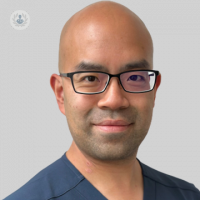How is spinal stenosis diagnosed?
Written by:Spinal stenosis falls under the medical spotlight in our latest medical article here, as esteemed consultant orthopaedic spinal surgeon, Mr Andraay Leung, tells us about the associated symptoms, causes, and treatment options for the common spine-affecting condition.

What is spinal stenosis?
Spinal stenosis is a condition that occurs when the spaces within the spine narrow. This puts pressure on the spinal cord and nerves in and around the spine.
What are the main symptoms?
Symptoms often develop gradually and may include:
- Pain
- Numbness or weakness
- Difficulty walking
- Relief when leaning forward
What are the main causes of spinal stenosis?
There are quite a few causes of spinal stenosis, with the most typical ones being:
- Ageing: Degenerative changes in the spine over time.
- Arthritis: Osteoarthritis or rheumatoid arthritis.
- Herniated discs: Discs that bulge or rupture.
- Bone spurs: Overgrowth of bone in response to wear and tear.
- Injury or trauma: Previous accidents or injuries.
- Congenital factors: Some people are born with a narrower spinal canal.
How is spinal stenosis diagnosed?
The diagnosis of spinal stenosis involves a combination of a physical examination, imaging tests such as X-rays, CT scans, or MRI, and an electromyography (EMG) to evaluate nerve function.
What are the most effective treatment options for spinal stenosis?
Conservative management is appropriate for patients who are experiencing mild spinal stenosis. This approach to treatment includes:
- Pain medications: Nonsteroidal anti-inflammatory drugs (NSAIDs) or muscle relaxants.
- Physical therapy: Strengthening exercises and posture improvement.
- Epidural steroid injections: To reduce inflammation.
There are also surgical options for people with severe spinal stenosis. The main surgical options are:
- Laminectomy: Removing part of the vertebra to relieve pressure.
- Foraminotomy: Widening the nerve passageways.
- Spinal fusion: Joining affected vertebrae.
Book an appointment today with Mr Andraay Leung today by visiting his Top Doctors profile.


